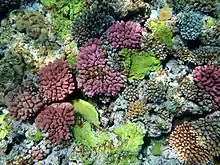Andia Chaves Fonnegra
Andia Chaves Fonnegra is a Colombian marine biologist. She received a L'Oréal-UNESCO scholarship to Women in Science in 2011 for her research on the marine sponge Cliona delitrix and its impact on coral reefs, becoming the fifth Colombian scientist to obtain such recognition.[1][2]
Andia Chaves Fonnegra | |
|---|---|
| Nationality | Colombian |
| Alma mater | Universidad Nacional de Colombia Nova Southeastern University |
| Scientific career | |
| Fields | marine biology marine ecology |
| Institutions | Universidad Nacional de Colombia INVEMAR Universidad Pedagógica Nacional (Colombia) Florida Atlantic University |
Education and career
Chaves graduated with a bachelor's degree in marine biology in 2001 from the National University of Colombia. In 2001 she joined the Instituto de Investigaciones Marinas y Costeras José Benito Vives de Andréis (INVEMAR) as an intern and research assistant.[3] She completed a master's degree in marine biology at the National University of Colombia after studying there from 2003 to 2006. In 2007 she taught at Colombia's Universidad Pedagogic Nacional. She taught at the University of Alberta from September 2007 to November 2008. In 2009 she moved to Florida and became a graduate student at Nova Southeastern University, where she graduated in 2014 with a PhD in oceanography and marine biology.[3][4]

After a variety of postdoc appointment, Chavez became in September 2018 an assistant professor at Florida Atlantic University, where she works at the Harbor Branch Oceanographic Institute.[4] She is known for her research on the marine sponge Cliona delitrix, an organism that grows between the calcium carbonate that forms the skeleton of coral reefs and that, through an excavating action, gradually deteriorates the coral. In the Caribbean Sea the development of this sponge has accelerated in recent years, resulting in the gradual erosion of corals, altering the ecosystem.[2][5]
Awards and recognitions
- 2002 - SIGMA XI Grant Award, Scientific Research Society
- 2006 - Meritorious Mention Master's Thesis, Universidad Nacional de Colombia
- 2008 - Donald Ross Academic Merit, University of Alberta.
- 2011 - L'Oréal-UNESCO Scholarship for Women in Science.
- 2014 - Student Life Achievement Award, Nova Southeastern University.
Selected publications
- Chaves-Fonnegra, Andia; Castellanos, Leonardo; Zea, Sven; Duque, Carmenza; Rodríguez, Jaime; Jiménez, Carlos (2008). "Clionapyrrolidine A—A Metabolite from the Encrusting and Excavating Sponge Cliona tenuis that Kills Coral Tissue upon Contact". Journal of Chemical Ecology. 34 (12): 1565–1574. doi:10.1007/s10886-008-9565-5. PMID 19023625. S2CID 21404694.
- Chaves-Fonnegra, Andia; Zea, Sven (2011). "Coral colonization by the encrusting excavating Caribbean sponge Cliona delitrix". Marine Ecology. 32 (2): 162–173. Bibcode:2011MarEc..32..162C. doi:10.1111/j.1439-0485.2010.00416.x.
- Chaves-Fonnegra, Andia; Maldonado, Manuel; Blackwelder, Patricia; Lopez, Jose V. (2015). "Asynchronous reproduction and multi-spawning in the coral-excavating sponge Cliona delitrix". Journal of the Marine Biological Association of the United Kingdom. 96 (2): 515–528. doi:10.1017/S0025315415000636. hdl:10261/121387. ISSN 0025-3154.
- Chaves-Fonnegra, A. (2014). Increase of excavating sponges on Caribbean coral reefs: Reproduction, dispersal, and coral deterioration. Dissertation. Nova Southeastern University.
- Chaves-Fonnegra, Andia; Feldheim, Kevin A.; Secord, Jesse; Lopez, Jose V. (2015). "Population structure and dispersal of the coral-excavating sponge Cliona delitrix". Molecular Ecology. 24 (7): 1447–1466. doi:10.1111/mec.13134. PMID 25732628. S2CID 4492547.
- Brandt, Marilyn E.; Olinger, Lauren K.; Chaves-Fonnegra, Andia; Olson, Julie B.; Gochfeld, Deborah J. (2019). "Coral recruitment is impacted by the presence of a sponge community". Marine Biology. 166 (4). doi:10.1007/s00227-019-3493-5. S2CID 91626018.
References
- "Outstanding women scientists to receive 2011 L'ORÉAL-UNESCO Awards and Fellowships". Geneva, Switzrland: UNESCO. 25 February 2011.
- Andia Chaves Fonnegra: científica colombiana ganadora de premio internacional Colciencias, 2 March 2011
- Andia Chaves Fonnegra, Curricullum Vitae (in Spanish) Colciencias (colciencias.gov.co)
- "Andia Chaves Fonnegra, Curriculum Vitae". Laboratory of Marine and Coastal Eclogy, Florida Atlantic University.
- "La científica Andia Chaves explica la situación de los corales". El Tiempo. 23 March 2011.